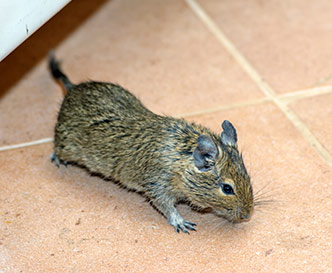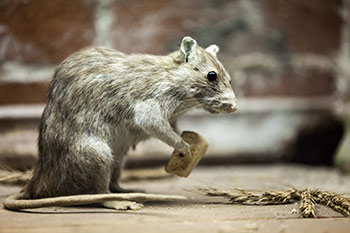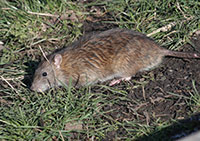Mouse in your house?
Seattle rodent control is needed all year 
Many people think rodents are most active in the fall though they are an ongoing problem all year long. Their activity level varies throughout the year as it coincides with changes in the environment that comes with each season. Let’s take a look at the rodent lifecycle starting in the fall.
In autumn, rodents are getting ready for the winter so they eat more, hoard more food and are looking to find shelter from the upcoming cold weather-possibly in your attic or crawlspace. Many people do not know rodent populations are actually the lowest during the winter since many do not survive the colder temperatures and natural food sources (vegetation and insects) are harder to find.
Did you know a female rat can have up to 84 babies in her 1-year life span?
With their annual breeding cycle beginning in March, rodents are abundant by late spring, which is perfect for them as the weather is starting to get warmer and the spring rains in the Seattle area mean plenty of food sources in the way of vegetation and breeding areas. By summer, rodents are having a great time as food and vegetation continue to be plentiful.
As a result of spring breeding, April, May and June are the months where there’s the highest population of rats and mice. Since there’s so many of them during this time, there’s lots of competition for food and shelter so they may try to enter your home to find a safe place to breed and/or raise their young along with wanting to find an easy food source. Another peek in breeding occurs in early September as temperatures begin to cool and they start hoarding food and getting ready for the winter.
Why is rodent control so important for Seattle homeowners?
Rodents cause many problems though their primary problem is that they consume and can contaminate your food. That’s a problem as rats and mice are known carriers of diseases, such as 
- Rat-bite fever
- Typhus
- Salmonella
- Plague
- Typhoid
- Tapeworms
How you can be exposed to virus
Deer mice can be found everywhere in the state of Washington and is the most prevalent carrier of the deadly Hantavirus, which is secreted in their urine, saliva and droppings. You and your family can be exposed to this virus by breathing contaminated dust after disturbing or cleaning up rodent droppings or nests. While other species may carry the virus, the deer mouse is the only species known to transmit the disease to humans.
Secondly is the damage caused by their gnawing, such as chewing through electrical wires, telephone wires, cables, alarm wires and even, PVC piping. Depending on WHAT they chewed, these repairs can be very costly and in the case of electrical wires-dangerous as it could cause a fire.
Rodents attract other problem-causing creatures
Fleas
Rodents are common carriers of fleas, which are blood sucking parasites that can transfer from 1 host to another. This allows for viral, bacterial and parasitic diseases to be passed on to other animals or humans. The Rat Flea is the most common cause for infection of the bubonic plague and murine typhus. Infection occurs when the flea feeds on an infected rodent and then bites a human.
Rat Mites
Bites can also come from rat mites, who are parasites that feed on the warm blood of the rodent. The mites find a host and feed at periodic intervals when they are ready to molt or breed and can survive weeks or months between meals. They have extremely itchy bites that can get worse over time. Rat Mites are usually a result of a rodent problem that has gone untreated and once they penetrate the structure of your home, they are hard to eliminate.
Beetles
Dermestid Beetles will lay eggs on the carcasses of dead rodents so their larvae can feed. They can spread fast throughout your home once they find a steady and abundant food source and will damage other animal products, like wool, silk, leather and fur. Their larvae will also feed on stored products such as spices and grains. The Dermestid beetles are the only beetles that feed on animal products; adult Carpet beetles feed on pollen and nectar.
What rodents cause the most problems for Seattle homeowners?
- Norway rat
- Roof rat
- House mouse
- Deer mouse
These rodents are common in the Pacific Northwest and are the culprits that will most often try to enter your home. Rodents are usually quiet, nocturnal creatures that come out at night to forage and collect nesting materials so they avoid people and predators. You may not even know you have them until you go into your attic and discover chewed up clothing or a repairman finds gnawed wires in your crawlspace.

Rodent prevention tips
- Remove any excess debris from your yard
- Relocate wood piles at least 25 ft. from your home and put wood on raised pallets
- Prune all trees and/or vegetation so it doesn’t touch your house
- Repair garage door gaskets and door threshold gaskets
- Store all pet foot in sealed metal cans with lids
- Store personal items in sealed containers and keep them off the garage floor
- Clean up debris in garage and any storage areas
- Store garbage in sealed containers with tight fitting lids-empty regularly
- Mow vegetation next to fences and fields to remove harborage
- Fix leaks and moisture sources
- Check roof/crawlspace vents and screen openings to prevent access
- Seal pipe, wires and other utility entrances to your home
- Pick up dog droppings and dispose of in your garbage can
